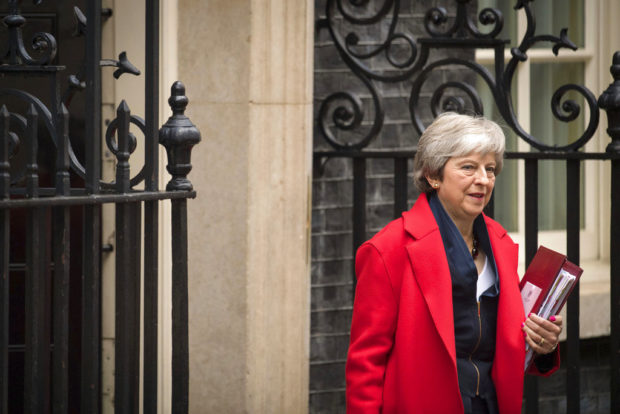
British Prime Minister Theresa May leaves 10 Downing Street, London, for the House of Commons to face Prime Minister’s Questions on Nov. 28, 2018. AP
LONDON — Britain will be poorer after leaving the European Union than if it had stayed in, no matter what sort of trade deal it has with the bloc, the government said Wednesday — bad news for Prime Minister Theresa May as she tries to sell her Brexit divorce deal to a skeptical nation.
A government assessment estimated that 15 years from the day of departure, GDP will be 0.6 percent lower than it would have been if Britain had stayed in the EU — if the UK maintains frictionless trade with the bloc.
If it leaves without a deal and there are significant barriers to trade, the economy would be up to 9.3 percent smaller.
The analysis looked at a range of options, from leaving without a deal to staying in the EU’s single market for goods and services.
It did not analyze the specific deal agreed upon between Britain and the bloc last week, but estimated that under similar terms the economic hit would be at the lower end of the range — a decline in GDP of between 2.5 percent and 3.9 percent compared to staying in the EU.
“If you look at this purely from an economic point of view there will be a cost to leaving the European Union, because there will be impediments to our trade,” said Treasury chief Philip Hammond.
But he said the deal agreed on between the British government and the EU, which calls for continued close economic ties, would minimize the economic damage.
May said the agreement “is the best deal available for jobs and our economy, that allows us to honor the referendum and realize the opportunities of Brexit.”
She added that “this analysis does not show that we will be poorer in the future than we are today.”
Supporters of Brexit argue that leaving the EU will bring benefits that such forecasts do not show, such as the power to control immigration and to strike new trade deals around the world.
The government assessment says new trade deals would do little to offset the economic damage done by Brexit. It estimates that deals with the United States, China and other countries would add only 0.2 percent to GDP after 15 years.
The government also says public sector net borrowing will increase under all scenarios, from a modest 1.3 billion pound ($1.7 billion) rise with a frictionless trade deal to an increase of 2.4 percent, or 119.1 billion pounds ($152 billion), under a “no deal” Brexit.”
The Bank of England plans to publish its own assessment later Wednesday of the economic impact of Brexit under different scenarios.
May is battling to persuade skeptical lawmakers to back the Brexit deal before Parliament votes Dec. 11 to accept or reject it.
On Wednesday she was visiting Scotland, which voted strongly to remain in the EU in Britain’s 2016 membership referendum.
Scottish First Minister Nicola Sturgeon says May’s deal is bad for Scotland and her Scottish National Party will vote against it. /ee